仁爱版初中英语代词专项复习
仁爱版七年级上册英语期中复习|语法 知识点总结及练习题(含答案)
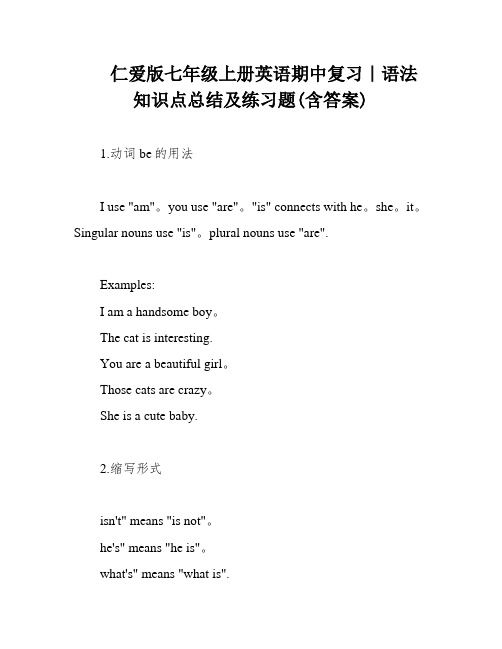
仁爱版七年级上册英语期中复习|语法知识点总结及练习题(含答案)1.动词be的用法I use "am"。
you use "are"。
"is" connects with he。
she。
it。
Singular nouns use "is"。
plural nouns use "are".Examples:I am a handsome boy。
The cat is interesting.You are a beautiful girl。
Those cats are crazy。
She is a cute baby.2.缩写形式isn't" means "is not"。
he's" means "he is"。
what's" means "what is".3.人称代词Subject pronouns: I。
you。
he。
she。
it。
we。
they。
Object pronouns: me。
you。
him。
her。
it。
us。
them.4.物主代词Pronouns that indicate n or ownership are called possessive pronouns。
also known as possessive case。
There are two types: noun possessive pronouns and adjective possessive pronouns.Adjective possessive pronouns must be placed before the noun。
modifying and limiting the noun as an attributive。
仁爱版七年级英语知识点梳理

仁爱版七年级英语知识点梳理Unit 1 How Do You Study for a Test?Vocabulary•academic (adj.) 学术的•advice (n.) 建议•chart (n.) 图表•classical (adj.) 古典的•experiment (n.) 实验•grade (n.) 年级,分数•method (n.) 方法•musician (n.) 音乐家•suggestion (n.) 建议,提议Useful Phrases•get ready for… 为…做好准备•make flashcards 制作抽认卡• a variety of 各种各样的•in order to 为了•take breaks 休息Grammar1.动词不定式•用于表达目的或意图–They study hard to get good grades.•接副词修饰–She plays the guitar beautifully to impress her friends.2.祈使句•用于表达建议或命令–Take a break and relax.Unit 2 What Is the Greenest Way to Travel? Vocabulary•bicycle (n.) 自行车•electric (adj.) 电动的•environment (n.) 环境•motorbike (n.) 摩托车•pollution (n.) 污染•public transportation 公共交通•recycle (v.) 回收利用•reuse (v.) 重复使用•walk (v.) 步行Useful Phrases• a lot of 很多•be made of 由…制成•in order to… 为了…•take advantage of 利用Grammar1.一般现在时•描述经常性活动或状态–I usually take the bus to school.•描述客观真理–The sun rises in the east.2.非谓语动词•表示相对于主语的动作或状态–I like walking in the park on weekends. Unit 3 Why Do You Like Pandas? Vocabulary•adorable (adj.) 可爱的•bamboo (n.) 竹子•behavior (n.) 行为•extinct (adj.) 灭绝的•habitat (n.) 栖息地•mammal (n.) 哺乳动物•natural (adj.) 自然的•survival (n.) 生存•wildlife (n.) 野生动物Useful Phrases•be famous for 因…而闻名•be used to 习惯于…•in danger 处于危险中•take care of 照顾Grammar1.一般过去时•描述过去的动作或状态–I liked pandas when I was young.•描述客观真理中的过去状态–Dinosaurs were extinct long before humans appeared.2.形容词的比较级和最高级•比较两个或多个物体或人的大小、高低、数量等–Pandas are cuter than koalas.•比较三个或三个以上物体或人的大小、高低、数量等–Elephants are the biggest land animals in the world. Unit 4 Can You Tell Me Where the Bank Is? Vocabulary•bank (n.) 银行•bookstore (n.) 书店•department store 百货商店•post office 邮局•skyscraper (n.) 摩天大楼•subway (n.) 地铁•supermarket (n.) 超市•traffic light 交通信号灯•turn left/right 向左/右转Useful Phrases•be across from 在…的对面•go straight 直走•next to 紧挨着•on the corner of 在…街角的Grammar1.介词短语表示方位•表示物体或人相对位置–The bank is across from the post office.•表示物体或人所在的位置–The supermarket is next to the bookstore.2.方位副词•表示方向或位置–Turn left at the traffic light.Unit 5 Do You Want to Watch a Game Show? Vocabulary•cheer (v.) 欢呼,喝彩•contestant (n.) 参赛者•entertainment (n.) 娱乐•host (n.) 主持人•live (adj.) 直播的•quiz (n.) 测验•reality show 真人秀•sitcom (n.) 情景喜剧•talent show 才艺秀Useful Phrases•have fun 玩得愉快•have a good time 过得愉快•in my opinion 在我看来•be similar to 与…相似Grammar1.情态动词 can 表示能力或请求•表示能力–I can speak Chinese and English.•表示请求–Can you help me with my homework?2.双宾语动词•受词可以是人也可以是物–My parents bought me a new bike for my birthday. Unit 6 I’m More Outgoing Than My Sister. Vocabulary•athletic (adj.) 运动的•creative (adj.) 有创造力的•friendly (adj.) 友好的•funny (adj.) 有趣的•outgoing (adj.) 外向的•quiet (adj.) 安静的•serious (adj.) 严肃的•shy (adj.) 害羞的•talkative (adj.) 多话的Useful Phrases•as…as 和…一样•be interested in… 对…感兴趣•in total 共计•be good at… 擅长于…Grammar1.形容词和副词的比较级和最高级•形容词比较级和最高级–My dog is bigger than yours.–Elephants are the biggest land animals in the world.•副词比较级和最高级–She sings better than everyone else in the class.–He always gets up the earliest in his family.2.非限制性定语从句•描述前面主句中人或物的情况–My sister, who is outgoing, loves making friends. Unit 7 What Does He Look Like?Vocabulary•bald (adj.) 秃头的•beard (n.) 胡子•curly (adj.) 卷曲的•handsome (adj.) 英俊的•mustache (n.) 小胡子•slim (adj.) 苗条的•tall (adj.) 高的•wavy (adj.) 波浪形的•overweight (adj.) 超重的Useful Phrases•be fond of 喜爱•be proud of 为…感到自豪•have a beard 留胡子•have curly hair 有卷发Grammar1.一般现在时表状态•描述可以看到或感觉到的状态–She has short, straight hair.•描述情感状态–They love animals and have a lot of pets.2.情态动词 should 表示建议•给出建议–You should eat more fruits and vegetables.Unit 8 How Was Your School Trip?Vocabulary•exciting (adj.) 令人兴奋的•get lost 迷路•hike (v.) 徒步旅行•learn about 学习•performance (n.) 表演•sightseeing (n.) 观光•souvenir (n.) 纪念品•visit (v.) 参观•waterfall (n.) 瀑布Useful Phrases•be afraid of 害怕•be surprised at 对…感到惊讶•look forward to 期待•take pictures 照相Grammar1.过去进行时•描述过去某个时刻正在进行的动作–We were hiking in the mountains when it started raining.•描述过去的某个时间段内正在进行的动作–They were sightseeing in Paris for a week.2.不定式作宾语•跟在某些动词、形容词或名词后面–We decided to visit the museum.Unit 9 How Do You Make a Banana Milk Shake? Vocabulary•blender (n.) 搅拌器•chop up 切碎•cook (v.) 烹饪•delicious (adj.) 美味的•ingredient (n.) 食材•mix (v.) 混合•recipe (n.) 食谱•salad (n.) 沙拉•sandwich (n.) 三明治Useful Phrases•add 加入•be good for 对…有益•instead of 代替…•follow…instructions 按照…的步骤Grammar1.现在进行时表示将来•表示已经安排好的未来事件–I am meeting my friends at the cinema tonight.•表示即将发生的事件–We are going to a party this weekend.2.不定式作状语•修饰动词–Jane went to the store to buy some fruits and vegetables.•修饰形容词或副词–It’s important to eat healthily and exercise regularly.Unit 10 I’d Like Some Noodles.Vocabulary•beef (n.) 牛肉•chicken (n.) 鸡肉•cook (n.) 厨师•duck (n.) 鸭肉•noodles (n.) 面条•pork (n.) 猪肉•seafood (n.) 海鲜•shrimp (n.) 虾•spicy (adj.) 辣的Useful Phrases•be allergic to 对…过敏•be full of 充满着…•be healthful 对…有益•be high in 富含…Grammar1.物主代词•代替名词作定语或宾语–His parents are both doctors.–I lost my phone on the way to school.2.祈使句表示命令或请求•命令–Try the spicy noodle soup. It’s really good.•请求–Could you pass me the salt, please?。
2021年仁爱版初中英语七年级上册期末考复习资料汇总

2021年仁爱版初中英语七年级上册期末考复习资料汇总1.冠词a an thean orange an egg an apple an hour an English an American boy an erasera book a ruler the book the books2. 疑问词What 什么 what color 什么颜色 who 谁 whose 谁的Where 哪里 How 怎样 why 为什么 when 什么时候3. 人称代词主格宾格形性+名词名性主格宾格形性+名词名性I me my mine We us our oursyou you your yours you you your yourshe him his hisshe her her hers they them their theirsit it its itsone 指同类不同个 Liming has a book and I have one,too.it 上面出现的同一个 Liming has a book. It is red.4. 表达喜欢和不喜欢I like ---- 我喜欢---- I like----- a little 我有点喜欢----I like-----a lot 我非常喜欢--- I like -----very much 我非常喜欢--- He likes ---- 我喜欢---- He likes ----- a little 我有点喜欢----He likes -----a lot 他非常喜欢--- He likes -----very much 他非常喜欢---I don't like ---- 我不喜欢---- I don't like ----at all 我根本不喜欢----He doesn't like ---- 他不喜欢---- He doesn't like ----at all 他根本不喜欢----5.Be 动词 am is areI am a student.Li Ming is a student. He is a cook.Li Ming and I are students. These are English books.They are students。
仁爱初中英语代词讲解与练习

代词的讲解与练习题代词可以分为以下七大类:人称代词同学们,你们知道吗?随着超女和快男在全国各地如火如荼地展开,我们熟悉的人称代词现在也站在舞台上了呢!来听听它们说什么吧:【No1】我们的分类:我们人称代词分为主格和宾格。
具体如下:主格有八个: I,you(你),_____,she,it,_____,you(你们),_____。
宾格也有八个:_____,you(你),him,_____,it,us,_____(你们),them。
[答案揭秘] he,we,they,me,her,you。
【No2】我们的用法“句子主语用主格,动、介词后接宾格”,听说过吗?这便是我们的用法了!来给你们解释一下吧:主格:在句子中只能作主语,通常放在句子开头,即谓语动词的前面。
主格常常与谓语动词在人称和数等方面保持一致。
如:She was at school yesterday. 她昨天在学校里。
They all like listening to Mr. Guo’s English class. 他们都喜欢听郭老师的英语课。
宾格:在句子中常常作宾语,偶尔也作表语,具体用在:1) 及物动词的后面用在及物动词give, pass, take, buy, tell, like等词的后面,作宾语。
如:My father often tells me some interesting stories. 爸爸经常给我讲一些有趣的故事。
Mum, can you take us to the Congtai Park tomorrow?妈妈,明天你能带我们去丛台公园吗?2) 介词的后面介词不单独使用,其后面常常接宾语,那么,宾格就常常用在介词:in, on, under, to, at, behind, between, for, of 等词的后面。
如:What about them? 他们怎么样?You must look after her. 你必须照顾她。
(完整版)仁爱版英语八年级上知识点归纳
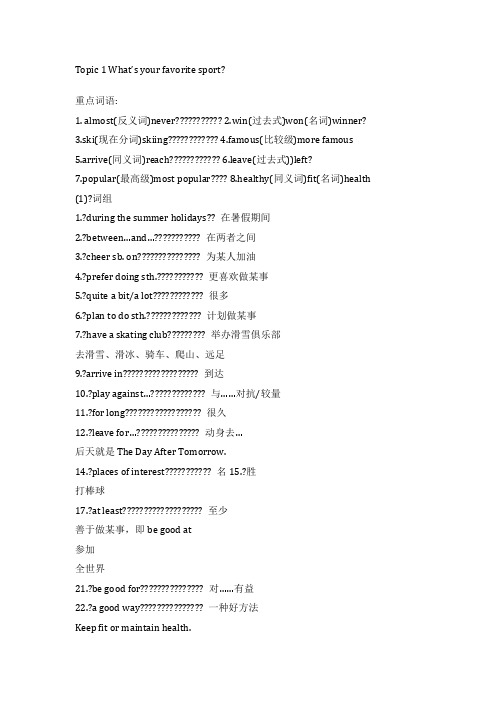
Topic 1 What’s your favorite sport?重点词语:1. almost(反义词)never2.win(过去式)won(名词)winner?3.ski(现在分词)skiing4.famous(比较级)more famous5.arrive(同义词)reach6.leave(过去式))left?7.popular(最高级)most popular 8.healthy(同义词)fit(名词)health (1)?词组1.?during the summer holidays?? 在暑假期间2.?between…and… 在两者之间3.?cheer sb. on 为某人加油4.?prefer doing sth. 更喜欢做某事5.?quite a bit/a lot 很多6.?plan to do sth. 计划做某事7.?have a skating club 举办滑雪俱乐部去滑雪、滑冰、骑车、爬山、远足9.?arrive in 到达10.?play against… 与……对抗/较量11.?for long 很久12.?leave for… 动身去…后天就是The Day After Tomorrow.14.?places of interest 名15.?胜打棒球17.?at least 至少善于做某事,即be good at参加全世界21.?be good for 对……有益22.?a good way 一种好方法Keep fit or maintain health.24.?relax oneself 放松某人自己重点句型你最喜爱的运动是什么?26.?Which sport do you prefer? = Which sport do you like better? 你更喜欢什么运动?I prefer skating. = I like skating better. 我更喜欢滑雪.你常滑雪吗?或Do you often skate?28.?She spends at least half an hour in the gym every day. 每天她至少花半小时在体育馆.29.?She plays baseball pretty well and she is also good at jumping.她棒球打得相当好而且擅长于跳.30.?What kind of sports do you like? = Which sport do you like? 你喜欢哪种运动? 重点语言点31.?see sb. do sth? “看见某人做了某事” 强调动作的全过程,常与every day; often 等连用.see sb. doing sth.? “看见某人正在做某事” 强调动作正在进行.I saw you play basketball almost every day during summer holidays.I often see him draw pictures near the river. 我常看见她在河边画画.I saw her go across the street.? 我看见她过了马路我看见她正在过马路。
(word完整版)七年级英语上册语法总汇仁爱版
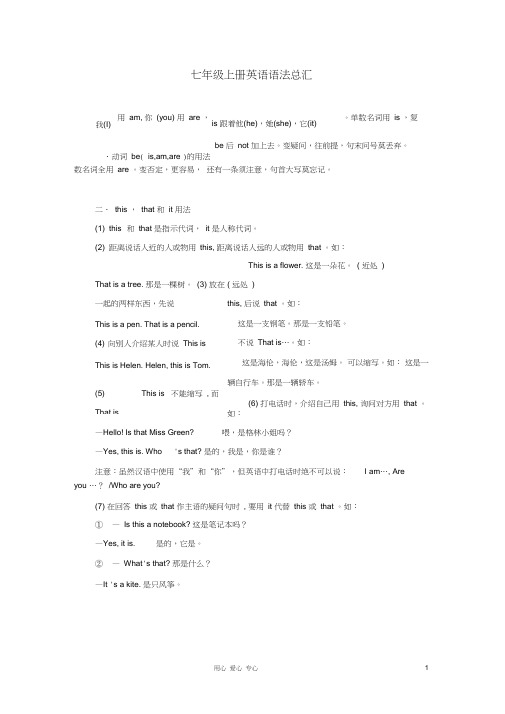
七年级上册英语语法总汇.动词 be ( is,am,are )的用法数名词全用 are 。
变否定,更容易, 还有一条须注意,句首大写莫忘记。
二. this , that 和 it 用法(1) this 和 that 是指示代词, it 是人称代词。
(2) 距离说话人近的人或物用 this, 距离说话人远的人或物用 that 。
如:This is a flower. 这是一朵花。
( 近处 )( 远处 ) this, 后说 that 。
如:这是一支钢笔。
那是一支铅笔。
不说 That is …。
如:这是海伦,海伦,这是汤姆。
可以缩写。
如: 这是一辆自行车。
那是一辆轿车。
(6) 打电话时,介绍自己用 this, 询问对方用 that 。
如:—Hello! Is that Miss Green? 喂,是格林小姐吗? —Yes, this is. Who's that? 是的,我是,你是谁?注意:虽然汉语中使用“我”和“你”,但英语中打电话时绝不可以说: I am …, Areyou …? /Who are you?(7) 在回答 this 或 that 作主语的疑问句时 , 要用 it 代替 this 或 that 。
如: ① — Is this a notebook? 这是笔记本吗? —Yes, it is.是的,它是。
② — What 's that? 那是什么? —It 's a kite. 是只风筝。
我(I)用 am, 你 (you) 用 are ,is 跟着他(he),她(she),它(it) 。
单数名词用 is ,复be 后 not 加上去。
变疑问,往前提,句末问号莫丢弃。
That is a tree. 那是一棵树。
(3) 放在一起的两样东西,先说 This is a pen. That is a pencil. (4) 向别人介绍某人时说 This is This is Helen. Helen, this is Tom. (5) This is 不能缩写 , 而That isthese 和those 用法和those 是指示代词,these 是this 的复数形式,指时间,距离较近的或下面要提到的人或事;those 是that 的复数形式,指时间、距离较远或前面已经提到过的人或事物。
(仁爱版)七年级英语总复习Unit-2知识点、练习和参考答案
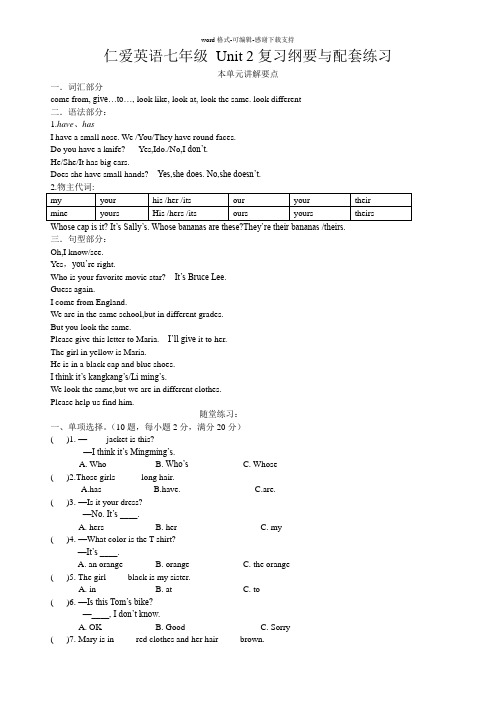
仁爱英语七年级Unit 2复习纲要与配套练习本单元讲解要点一.词汇部分come from, give…to…, look like, look at, look the same. look different二.语法部分:1.have、hasI have a small nose. We /You/They have round faces.Do you have a knife? Yes,Ido./No,I don’t.He/She/It has big ears.Does she have small hands? Yes,she does. No,she doesn’t.Whose cap is it? It’s Sally’s. Whose bananas are these?They’re their bananas /theirs.三.句型部分:Oh,I know/see.Yes,you’re right.Who is your favorite movie star? It’s Bruce Lee.Guess again.I come from England.We are in the same school,but in different grades.But you look the same.Please give this letter to Maria. I’ll give it to her.The girl in yellow is Maria.He is in a black cap and blue shoes.I think it’s kangkang’s/Li ming’s.We look the same,but we are in different clothes.Please help us find him.随堂练习:一、单项选择。
(10题,每小题2分,满分20分)( )1. —____ jacket is this?—I think it’s Mingming’s.A. WhoB. Who’sC. Whose( )2.Those girls _____ long hair.A.hasB.have.C.are.( )3. —Is it your dress?—No. It’s ____.A. hersB. herC. my( )4. —What color is the T-shirt?—It’s ____.A. an orangeB. orangeC. the orange( )5. The girl ____ black is my sister.A. inB. atC. to( )6. —Is this Tom’s bike?—____, I don’t know.A. OKB. GoodC. Sorry( )7. Mary is in ____ red clothes and her hair ____ brown.A. /; isB. a; areC. /; are( )8. —Do you look like your sister?—No, we ____.A. look the sameB. look differentC. look like( )9. —You are nice in this dress.—____A. It’s right.B. No, it isn’t.C. Thank you.( )10.-What does your brother look like?-She has _____nose.A.a big red B .a red big C.red big二、词汇运用。
仁爱版七年级下册英语复习知识点
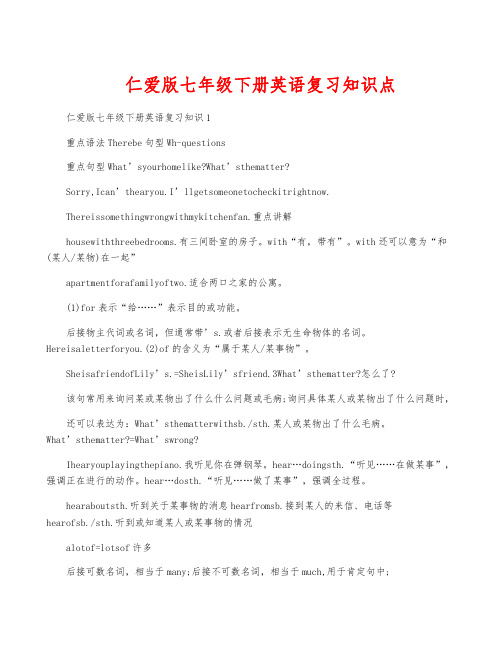
仁爱版七年级下册英语复习知识点仁爱版七年级下册英语复习知识1重点语法Therebe句型Wh-questions重点句型What’syourhomelike?What’sthematter?Sorry,Ican’thearyou.I’llgetsomeonetocheckitrightnow.Thereissomethingwrongwithmykitchenfan.重点讲解housewiththreebedrooms.有三间卧室的房子。
with“有,带有”。
with还可以意为“和(某人/某物)在一起”apartmentforafamilyoftwo.适合两口之家的公寓。
(1)for表示“给……”表示目的或功能。
后接物主代词或名词,但通常带’s.或者后接表示无生命物体的名词。
Hereisaletterforyou.(2)of的含义为“属于某人/某事物”。
SheisafriendofLily’s.=SheisLily’sfriend.3What’sthematter?怎么了?该句常用来询问某或某物出了什么什么问题或毛病;询问具体某人或某物出了什么问题时,还可以表达为:What’sthematterwithsb./sth.某人或某物出了什么毛病。
What’sthematter?=What’swrong?Ihearyouplayingthepiano.我听见你在弹钢琴。
hear…doingsth.“听见……在做某事”,强调正在进行的动作。
hear…dosth.“听见……做了某事”,强调全过程。
hearaboutsth.听到关于某事物的消息hearfromsb.接到某人的来信、电话等hearofsb./sth.听到或知道某人或某事物的情况alotof=lotsof许多后接可数名词,相当于many;后接不可数名词,相当于much,用于肯定句中;但是注意:如果是否定句,则常用many或much.befarfrom…离……远(抽象距离)be…awayfrom…离……远(具体距离)Myschoolisnotfarfromthebookstore.Theseais2milesawayfromthehotel.7Thereissomethi ngwrongwithsb./sth.某人或某物出问题/有毛病了。
仁爱版初中英语代词表(默写版)
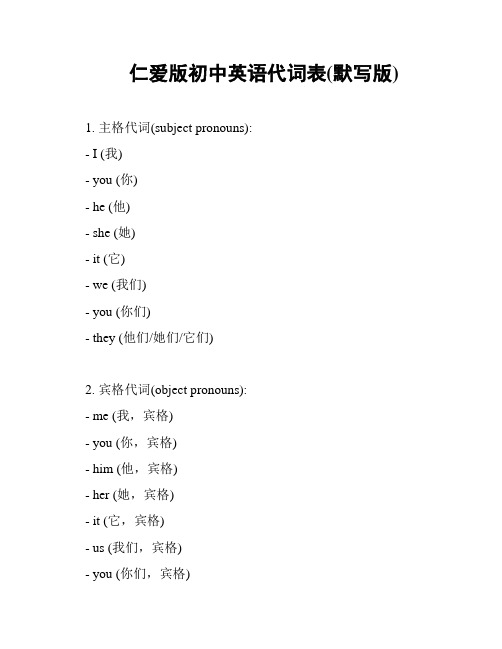
仁爱版初中英语代词表(默写版)1. 主格代词(subject pronouns):- I (我)- you (你)- he (他)- she (她)- it (它)- we (我们)- you (你们)- they (他们/她们/它们)2. 宾格代词(object pronouns):- me (我,宾格)- you (你,宾格)- him (他,宾格)- her (她,宾格)- it (它,宾格)- us (我们,宾格)- you (你们,宾格)- them (他们/她们/它们,宾格)3. 形容词性物主代词(adjective possessive pronouns): - my (我的)- your (你的)- his (他的)- her (她的)- its (它的)- our (我们的)- your (你们的)- their (他们的/她们的/它们的)4. 名词性物主代词(noun possessive pronouns):- mine (我的)- yours (你的)- his (他的)- hers (她的)- its (它的)- ours (我们的)- yours (你们的)- theirs (他们的/她们的/它们的)5. 反身代词(reflexive pronouns):- myself (我自己)- yourself (你自己)- himself (他自己)- herself (她自己)- itself (它自己)- ourselves (我们自己)- yourselves (你们自己)- themselves (他们自己/她们自己/它们自己)6. 相互代词(reciprocal pronouns):- each other (彼此)- one another (彼此)以上是仁爱版初中英语常见的代词及其用法,希望本文档对学生的英语默写练习有所帮助。
代词知识点详解(初中英语专项复习) (8)
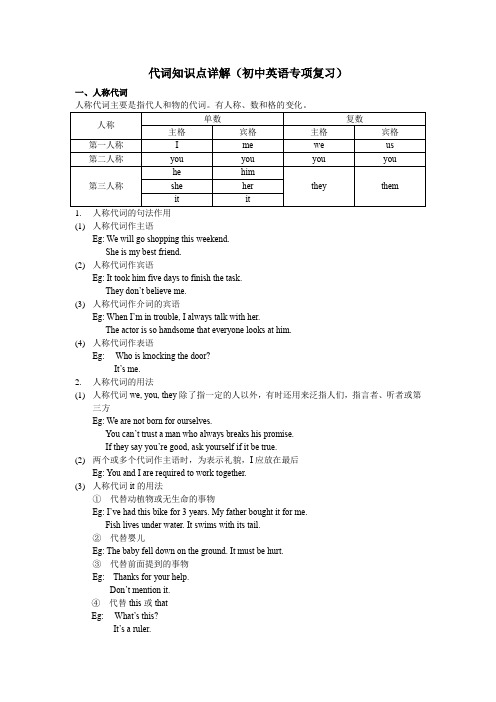
代词知识点详解(初中英语专项复习)一、人称代词人称代词主要是指代人和物的代词。
有人称、数和格的变化。
1.人称代词的句法作用(1)人称代词作主语Eg: We will go shopping this weekend.She is my best friend.(2)人称代词作宾语Eg: It took him five days to finish the task.They don’t believe me.(3)人称代词作介词的宾语Eg: When I’m in trouble, I always talk with her.The actor is so handsome that everyone looks at him.(4)人称代词作表语Eg: ---Who is knocking the door?---It’s me.2.人称代词的用法(1)人称代词we, you, they除了指一定的人以外,有时还用来泛指人们,指言者、听者或第三方Eg: We are not born for ourselves.You can’t trust a man who always breaks his promise.If they say you’re good, ask yourself if it be true.(2)两个或多个代词作主语时,为表示礼貌,I应放在最后Eg: You and I are required to work together.(3)人称代词it的用法①代替动植物或无生命的事物Eg: I’ve had this bike for 3 years. My father bought it for me.Fish lives under water. It swims with its tail.②代替婴儿Eg: The baby fell down on the ground. It must be hurt.③代替前面提到的事物Eg:---Thanks for your help.---Don’t mention it.④代替this或thatEg: ---What’s this?---It’s a ruler.二、物主代词物主代词表示所属关系,包括形容词性物主代词和名词性物主代词,有人称和数的变化,单1.物主代词的句法作用(1)形容词性物主代词:相当于于形容词,置于名词前,作定语。
新版仁爱英语七年级上册知识点归纳
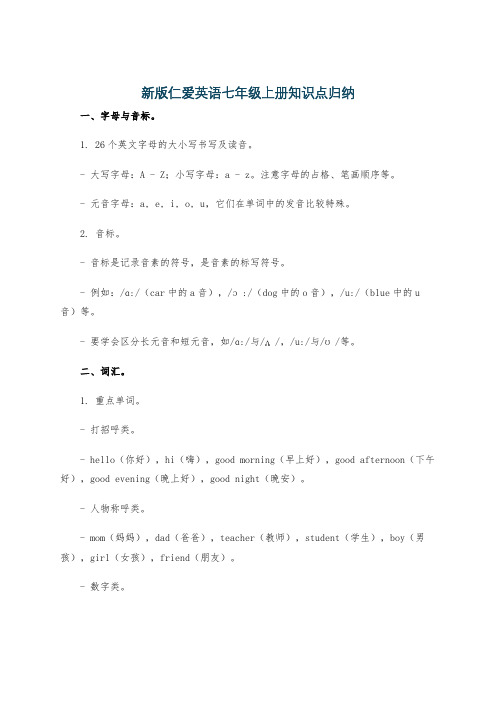
新版仁爱英语七年级上册知识点归纳一、字母与音标。
1. 26个英文字母的大小写书写及读音。
- 大写字母:A - Z;小写字母:a - z。
注意字母的占格、笔画顺序等。
- 元音字母:a, e, i, o, u,它们在单词中的发音比较特殊。
2. 音标。
- 音标是记录音素的符号,是音素的标写符号。
- 例如:/ɑ:/(car中的a音),/ɔ:/(dog中的o音),/u:/(blue中的u 音)等。
- 要学会区分长元音和短元音,如/ɑ:/与/ʌ/,/u:/与/ʊ/等。
二、词汇。
1. 重点单词。
- 打招呼类。
- hello(你好),hi(嗨),good morning(早上好),good afternoon(下午好),good evening(晚上好),good night(晚安)。
- 人物称呼类。
- mom(妈妈),dad(爸爸),teacher(教师),student(学生),boy(男孩),girl(女孩),friend(朋友)。
- 数字类。
- one,two,three,four,five,six(6),seven(7),eight(8),nine (9),ten(10)。
- 颜色类。
- red(红色),blue(蓝色),green(绿色),yellow(黄色),black(黑色),white(白色)。
- 文具类。
- pen(钢笔),pencil(铅笔),ruler(尺子),eraser(橡皮擦),book (书),notebook(笔记本)。
2. 单词的复数形式。
- 一般情况加 -s,如book - books,pen - pens。
- 以s, x, ch, sh结尾的加 -es,如box - boxes,bus - buses。
- 以辅音字母+y结尾的,变y为i加 -es,如baby - babies。
- 不规则复数形式,如man - men,woman - women,child - children。
代词知识点详解(初中英语专项复习) (12)

代词知识点详解(初中英语专项复习)考向1 人称代词口诀使用范例Mrs.Green will come here. I can't wait to see .A.himB.herC.youD.me考查人称代词主格和宾格用法时用此口诀答案解析:see表“看见”,为动词,根据大招“动介后宾”可知,其后的人称代词应该用宾格。
处指代Green夫人,所以用第三人称单数的宾格形式her.故选B.解题坑点1.“动介后宾”,注意介词后人称代词也要用宾格(例如:This book belongs to me.).2.常考teach sb.sth.,注意这里的sb.用人称代词的宾格形式,而不是使用物主代词(例如:She teaches us English.).典例The children have painted since ________ could first pick up a brush.A.they B.them C.their D.themselves【答案】A【详解】句意:孩子们从第一次拿起画笔就开始画画了。
考查代词。
they他们,主格;them他们,宾格;their他们的,形容词性物主代词;themselves 他们自己,反身代词。
空处作从句的主语,应用主格,故选A。
考向2 物主代词口诀使用范例This isn't skirt. is on the sofa.A.you;Y oursB.his;HimC.my;Mine考查名词性物主代词和形容词性物主代词的用法区别时,用此口诀解题。
答案解析:根据句意可知,两空都应该填物主代词。
第一空后面接名词skirt,根据大招“有名则形”可知,填形容词性物主代词。
第二空后面没有接名词,根据大招“无名则名”可知,填名词性物主代词。
故选C.解题坑点形容词性物主代词相当于形容词,名词性物主代词相当于名词。
名词性物主代词=形容词性物主代词+名词,例如:mine=my+名典例My sister enjoys singing and ________ favorite subject is music.A.his B.her C.your D.their【答案】B【详解】句意:我妹妹喜欢唱歌,她最喜欢的科目是音乐。
初中英语总复习材料仁爱版
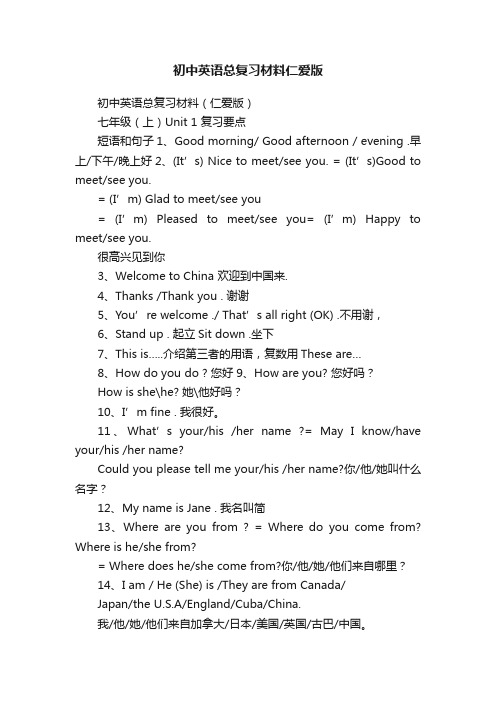
初中英语总复习材料仁爱版初中英语总复习材料(仁爱版)七年级(上)Unit 1 复习要点短语和句子1、Good morning/ Good afternoon / evening .早上/下午/晚上好2、(It’s) Nice to meet/see you. = (It’s)Good to meet/see you.= (I’m) Glad to meet/see you= (I’m) Pleased to meet/see you= (I’m) Happy to meet/see you.很高兴见到你3、Welcome to China 欢迎到中国来.4、Thanks /Thank you . 谢谢5、You’re welcome ./ That’s all right (OK) .不用谢,6、Stand up . 起立Sit down .坐下7、This is…..介绍第三者的用语,复数用These are…8、How do you do ? 您好9、How are you? 您好吗?How is she\he? 她\他好吗?10、I’m fine . 我很好。
11、What’s your/his /her name ?= May I know/have your/his /her name?Could you please tell me your/his /her name?你/他/她叫什么名字?12、My name is Jane . 我名叫简13、Where are you from ? = Where do you come from? Where is he/she from?= Where does he/she come from?你/他/她/他们来自哪里?14、I am / He (She) is /They are from Canada/Japan/the U.S.A/England/Cuba/China.我/他/她/他们来自加拿大/日本/美国/英国/古巴/中国。
【中考英语复习之语法过关(仁爱版)】课时02 代词(学生版)

第二课时 代词代词在近年中考试题中出现频率很高,每年至少测试一道题。
中考考查重点主要分布在: ①人称代词的主格和宾格 ①形容词性物主代词和名词性物主代词 ①反身代词与习惯搭配 ①不定代词的用法 ①it 用法及相关句型考点1人称代词、物主代词和反身代词(2)两个以上的人称代词并列,其次序排列原则:在并列主语中,“I”总是放在最后,排列顺序为:二三一(人称)。
宾格me 也一样。
(3)物主代词分为形容词性物主代词和名词性物主代词两种。
名词性物主代词可作主语和宾语。
4..反身代词的常用词组teach oneself自学learn by oneself自学enjoy oneself过得愉快;玩得高兴help oneself to随便吃/用come to oneself苏醒hurt oneself受伤by oneself独自1.(2020福建,22)Li Lei and his cousin made some zongzi by during the Dragon Boat Festival.A.themB.theyC.themselves2.(2019福建,23)—Oh, I forgot to bring my umbrella.—I’ve got one. You can share .A.yoursB.oursC.mine3.(2017福建,23)—Our English teacher will work for 2017 BRICS Summit(金砖峰会) this September.—Great!I am so proud of .A.sheB.herC.hers4.(2021福州一模,23)My mom told me to take care of in England. She worried that I couldn’t eat or sleep well there.A.herselfB.myselfC.ourselves5.(2021龙岩一模,22)—Is this pencil box yours?—No. Sally lost a pencil box. Maybe it’s .A.mineB.yoursC.hers6.(2020福建,87)We do not know whether this story is true, but it tells (we) that rice has the same value as gold to the Chinese.7.(2018福建,84)By high school, Lonnie built a remote-control robot from some waste things. This won him first prize at the Alabama State Science Fair. His friends called “The Little Scientist”.8.(2021三明一模,87)I found many old stickers and cut (they) to make my own diaries.1.itIt was foolish of her to say such a thing.她说这样的事,真是太蠢了。
仁爱初中英语七、八、九年级所有知识点归纳
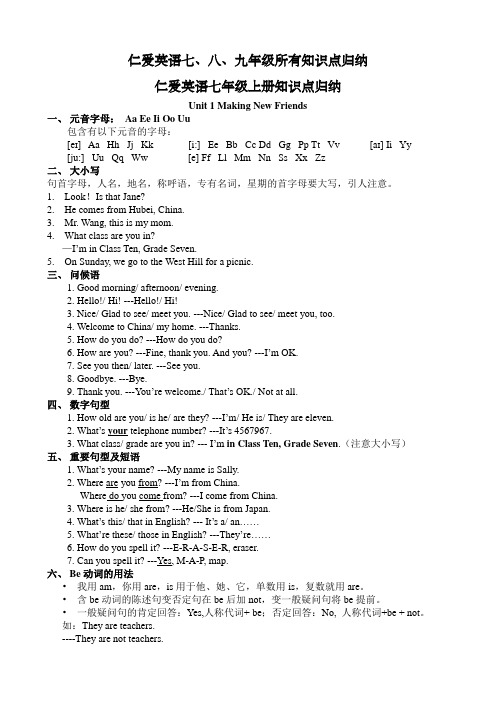
仁爱英语七、八、九年级所有知识点归纳仁爱英语七年级上册知识点归纳Unit 1 Making New Friends一、元音字母:Aa Ee Ii Oo Uu包含有以下元音的字母:[eɪ] Aa Hh Jj Kk [i:] Ee Bb Cc Dd Gg Pp Tt Vv [aɪ] Ii Yy [ju:] Uu Qq Ww [e] Ff Ll Mm Nn Ss Xx Zz二、大小写句首字母,人名,地名,称呼语,专有名词,星期的首字母要大写,引人注意。
1.Look!Is that Jane?2.He comes from Hubei, China.3.Mr. Wang, this is my mom.4.What class are you in?—I’m in Class Ten, Grade Seven.5.On Sunday, we go to the West Hill for a picnic.三、问候语1. Good morning/ afternoon/ evening.2. Hello!/ Hi! ---Hello!/ Hi!3. Nice/ Glad to see/ meet you. ---Nice/ Glad to see/ meet you, too.4. Welcome to China/ my home. ---Thanks.5. How do you do? ---How do you do?6. How are you? ---Fine, thank you. And you? ---I’m OK.7. See you then/ later. ---See you.8. Goodbye. ---Bye.9. Thank you. ---You’re welcome./ That’s OK./ Not at all.四、数字句型1. How old are you/ is he/ are they? ---I’m/ He is/ They are eleven.2. What’s your telephone number? ---It’s 4567967.3. What class/ grade are you in? --- I’m in Class Ten, Grade Seven.(注意大小写)五、重要句型及短语1. What’s your name? ---My name is Sally.2. Where are you from? ---I’m from China.Where do you come from? ---I come from China.3. Where is he/ she from? ---He/She is from Japan.4. What’s this/ that in English? --- It’s a/ an……5. What’re these/ those in English? ---They’re……6. How do you spell it? ---E-R-A-S-E-R, eraser.7. Can you spell it? ---Yes, M-A-P, map.六、Be动词的用法•我用am,你用are,is用于他、她、它,单数用is,复数就用are。
仁爱英语七年级人称代词
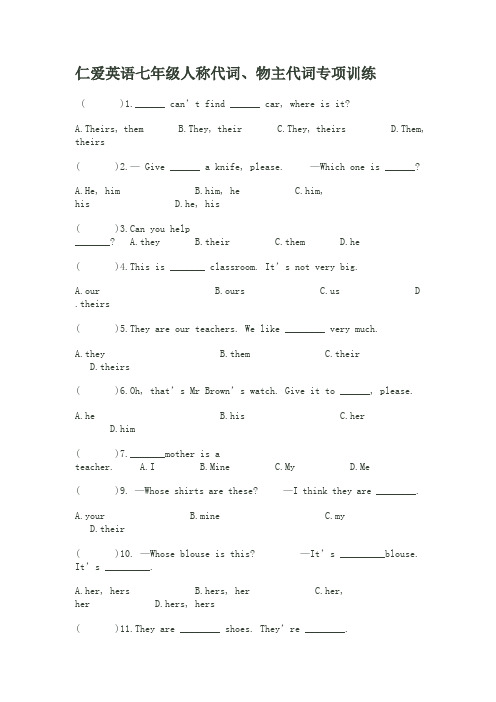
仁爱英语七年级人称代词、物主代词专项训练( )1.______ can’t find ______ car, where is it?A.Theirs, themB.They, theirC.They, theirsD.Them, theirs( )2.— Give ______ a knife, please. —Which one is ______?A.He, himB.him, heC.him,his D.he, his( )3.Can you help_______? A.they B.their C.them D.he( )4.This is _______ classroom. It’s not very big.A.ourB.ours D .theirs( )5.They are our teachers. We like ________ very much.A.theyB.themC.theirD.theirs( )6.Oh, that’s Mr Brown’s watch. Give it to ______, please.A.heB.hisC.herD.him( )7._______mother is ateacher. A.I B.Mine C.My D.Me( )9. —Whose shirts are these? —I think they are ________.A.yourB.mineC.myD.their( )10. —Whose blouse is this? —It’s _________blouse. It’s _________.A.her, hersB.hers, herC.her,her D.hers, hers( )11.They are ________ shoes. They’re ________.A.mine,myB.my,myC.mine,mineD.my, mine( )12.That’s OK. Let _______ helpyou. A.I B.me C.my D.mine( )13.Jim, is this ______ football sock? Yes, It’s ________.A.you, meB.your, myC.your, mineD.yours, mine( )14. —Where are Li Lei and Jim? —Look, _____ are in ______ classroom.A.they, theirB.they, themC.them,they D.them, theirs( )15.______ is the plane? It’s ________.A.whoes, oursB.Whose, oursC.Whose, ourD.Whose, us( )16.I think it’s_______. A.she B.her C.hers D.s he’s( )17.This watch is not _______. _______ think it’s ________.A.mine, I, herB.mine, I, hersC.my, She, hisD.me, He, him( )18.Is this book ______? Oh, yes, it’s ______.A.you, my b.your, me C.yours, mine D.ours, I( )20.Tom has a yellow bag. Is that_______? A.him B.he C.he’s D.his( )21.Is this yellow coat________? A.you B.your C.yours D.your’s( )22.Li Ming is a good ________.A.friend of meB.friend of mineC.mine friendD.my friend( )25. —Are those shoes ________? —No, they aren’t.A.yourB.youC.yoursD.their( )26.Don’t pu t the chairs here. Put _____ in the room.A.theyB.theirC.them d.theirs( )27.This is not my shirt. It’s ______.A.herB.hisC.yourD.you( )28.I have a good friend at school. ______ is Miss Wang.A.SheB.HisC.HerD.She’s( )29.That’s not my bag. It’s _________.A.TomB.Tom’sC.herD.you填上适当的人称你词或物主代词1.I have no water. Can you give ______ some?3.The kids are good students. ______ teacher likes _______ very much.4.My brother is a worker. _______ likes _______ work.5. We need help. Can you come and help ________?6.A clock has no legs. But ______ has three hands on ______ face.8.Could you give me ______ pen? _______ is broken.10.Oh, _______ think Mary and _______ brother are at home.11.Can _______ help me? The box is too heavy.12.These are our bikes. They’re _______.13.Don’t call _____ names. They are sleeping(睡觉).14.A banana is a kind of food. ________ color is yellow.15.I do my homework at home. Where does she do ________?17.I often wash(洗) ______ face before sleeping(睡觉).18.He knows my pen is broken(坏了), and he gives me _______.19.Mr and Mrs Green and a friend of ________ are coming to see us.20.She’s a teacher. ________ name is Miss Gao.21.They are twins(双胞胎). _______ father is a teacher.22.Our books are all here. Is ________ here?24.My book is not here, I think _______ is at home.25.Your school is big, but ________ is bigger. We like ______ school.26.Mr Li teaches ________English. We all like _______.27. Tom and I are in Class One. _______ are good friends.用所给的词选择填空1、These are pens and ________ are pencils. (that, this, those)2、This desk is mine, ______ is hers. ( those, this, that)3、_______ (He, Her, His ) mane is Jack. . _______ (She, He, His) is a cook.4、_______ (I,My,Mine)aunt is a nurse. ______ (She, He. Her) works very hard.5、Please show _______ (me, I, mine ) the way.6、The books aren't ( my, mine, I ). ________ (They , It, Its ) may be _______(her, hers, your)7、Let ______(I, me, mine) tell _______(her, she, hers ) how to do it.8、Help _____ (you, your, yourself ) to some fish, please.9、Don't tell _______ (he, him, his ) the answer(答案).10、The lady in red is _______(mine, my, me) aunt. _______(She, Her, Herself) often sings English songs with _______( her, hers, she ) husband(丈夫).11、A friend of _____( me, my, mine) often helps _______ (I, me, mine) with _____(mine, my, I ) homework.六、用人称代词,物主代词,指示代词和反身代词填空1、______ is 9 o'clock now. Let _____ start(开始) our work.2、Thank you very much for ______ help.3、"Who is ________, please " Tom answered the phone(接电话). "________ is Anne speaking."4、"Are these books yours " "No, _______ are not ________. They are Tom's."5、"Please open _______ books and read after ______", the teacher says.6、Please help ________ to some apples, ladies.。
代词知识点详解(初中英语专项复习) (4)

代词知识点详解(初中英语专项复习)一、人称代词二、物主代词注意:1. 人称代词在句子中作主语时用主格,作及物动词或介词的宾语时用宾格。
如:He goes to school on foot.He told me that he would go there.Bob is going to Shanghai on holiday with her.2. 人称代词作表语时用宾格。
如:— Who is knocking at the door? —It’s me, Tom.3. 形容词性物主代词只能用在名词前作定语,修饰名词。
如:They are doing their homework.4. 名词性物主代词在句子中可作主语、宾语、表语。
如:— Whose book is this?—It’s mine. Yours is under the table.I usually tidy my room. You should tidy yours.三、反身代词1)作宾语,表示反身代词与主语是同一人。
The girl is too young to look after herself. 这个女孩年纪太小,不能照顾自己。
Uncle Chen teaches himself English. 陈叔叔自学英语。
(2)作表语,常用于be, feel, seem, look等系动词之后,用来描述感觉、情绪或状态。
He is not himself today. 他今天不舒服。
I’m not feeling myself today. 我今天不太舒服。
(3)作同位语,表示强调,译成“亲自”“本人”。
You must do it yourself. 你必须自己做。
I myself did the homework last night. 昨晚是我自己做的家庭作业。
(4)用于固定搭配中。
by oneself独自;单独come to oneself苏醒dress oneself自己穿衣服enjoy oneself玩得开心help oneself to随便吃……四、指示代词1. 定义:表示"这个""那个""这些""那些"等指示概念的代词叫指示代词。
仁爱版初中英语语法(归纳)

仁爱版初中英语语法一.名词I. 名词的种类:II. 名词的数:1. 规则名词的复数形式:名词的复数形式,一般在单数形式后面加-s或-es。
现将构成方法与读音规则列表如下:2. 不规则名词复数:英语里有些名词的复数形式是不规则的,现归纳如下:III. 名词的所有格:名词在句中表示所有关系的语法形式叫做名词所有格。
所有格分两种:一是名词词尾加’s构成,二是由介词of加名词构成。
前者多表示有生命的东西,后者多表示无生命的东西。
1. ’s所有格的构成:2. ’s所有格的用法:3. of所有格的用法:用于无生命的东西:the legs of the chair, the cover of the book用于有生命的东西,尤其是有较长定语时:the classrooms of the first-year students用于名词化的词:the struggle of the oppressed二.冠词冠词分为不定冠词(a, an),定冠词(the),和零冠词。
I. 不定冠词的用法:II. 定冠词的用法:III. 零冠词的用法:三.代词:I. 代词可以分为以下七大类:II. 不定代词用法注意点:1. one, some与any:1) one可以泛指任何人,也可特指,复数为ones。
some多用于肯定句,any多用于疑问句和否定句。
One should learn to think of others.Have you any bookmarks? No, I don’t have any bookmarks.I have some questions to ask.2) some可用于疑问句中,表示盼望得到肯定的答复,或者表示建议,请求等。
Would you like some bananas? Could you give me some money?3) some 和any修饰可数名词单数时,some表示某个,any表示任何一个。
- 1、下载文档前请自行甄别文档内容的完整性,平台不提供额外的编辑、内容补充、找答案等附加服务。
- 2、"仅部分预览"的文档,不可在线预览部分如存在完整性等问题,可反馈申请退款(可完整预览的文档不适用该条件!)。
- 3、如文档侵犯您的权益,请联系客服反馈,我们会尽快为您处理(人工客服工作时间:9:00-18:30)。
三、反身代词:与self(单数)、selves(复数) 1.常考词组: enjoy oneself 玩得开心 help oneself to sth.随便吃点什么 四、指示代词:this\these(近指) that\those(远指)
this\that (单数)+名词+Vs these\thoes(复数)+名词s+V 介绍某人:this is sb. 打电话用语:This is sb.我是谁。 Who is that ?你是谁?
考点:人称代词、物主代词、反身 代词、不定代词和疑问代词
一、人称代词:主格和宾格 1.主格做主语,宾格做宾语 2.动宾介宾:动词后面加宾格,介词后面加宾格 二、物主代词:形容词性物主代词和名词性物主代词
1.形容词性物主代词表示某人的,当作形容词,不能单 独使用,后面一定要加名词,只能作定语。 2.名词性物主代词表示某人的东西,当作名词可以单独 使用,后面不加名词,可以作主语,宾语。 3.形容词物主代词+名词=名词性物主代词 eg:This is my book.=This is mine.
5.关于other的用法
1)The other:另一个(两者之间)句型:one…the other… 2)The others:全部(指三个或三个以上剩下的全部) 3)other(其他的,形容词)与others (其他人\物,名词): other+名词=others 4)another:另外一个(三者或三者以上)another+数字:另外几个
4.词组
1)both of sb.两者都,谓语动词是原形\复数,表肯定(两者) 2)neither of sb.两者都不,谓语动词是单数,表否定(两者) 3)all of sb.全部都,谓语动词是原形\复数,表肯定(三者上) 4)none of sb.全部都不,谓语动词是原形\复数,表否定(三者上) 5)either of sb.两者其中之一,谓语动词是单数,表肯定(两者之一)
3.一些:some ,any ,a few ,few ,a little, little 1) a few, few 后面加可数名词复数,a few 表 示肯定,few 表示否定;a little ,little 后面 加不可数名词,a little 表示肯定,little表 示否定。 2)any用于否定句、疑问句。some 用于肯定 句和表建议的疑问句 Would you like sth ?yes ,please. No ,thanks. Why not do sth?=why don’t you do sth? How about =what about +doin词+形容词:something new 2)不定代词+to do : something to drink 3)不定代词做主语时谓语动词是单数 2.许多:many much a lot of=lots of a lot of =lots of后面加可数名词复数和不可数名词 many后面加可数名词复数,much后面加不可数名词
